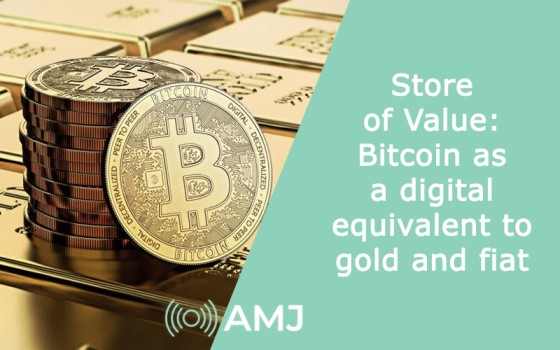In the ever-evolving landscape of finance and technology, a new contender has emerged in the form of a digital cryptocurrency that is making its mark as a potential store of value comparable to traditional assets like gold and fiat currency. As the world becomes more digitally connected, the concept of value storage has taken on new dimensions, and Bitcoin’s is at the forefront of this digital financial revolution. Users can explore Matrixator System, where they will find the best cryptocurrency deals available for trading and investment.
Contents
Bitcoin’s Unique Proposition
A Borderless and Decentralized Asset
Bitcoin, often referred to as “digital gold,” offers a unique proposition as a store of value. Unlike traditional currencies that are regulated by central banks and governments, Bitcoin operates on a decentralized network known as the blockchain. This means that its value is not tied to any specific country or jurisdiction, making it immune to the policies and economic fluctuations of any single nation.
Scarcity and Inherent Value
One of the primary factors that position Bitcoin as a potential store of value is its scarcity. Similar to precious metals like gold, Bitcoin has a capped supply; only 21 million coins will ever be mined. This scarcity drives the perception of inherent value, much like gold’s rarity has historically made it a sought-after asset.
Digital Portability and Accessibility
In an increasingly interconnected world, the digital nature of Bitcoin grants it unparalleled portability and accessibility. Bitcoin can be sent or received across borders within minutes, and transactions are recorded transparently on the blockchain. This level of ease and speed in value transfer is a significant advantage over traditional forms of value storage.
Comparing Bitcoin to Gold and Fiat
Gold: A Time-Tested Store of Value
For centuries, gold has been a reliable store of value due to its scarcity, durability, and universal acceptance. Investors have turned to gold during times of economic uncertainty as a hedge against inflation and market volatility. However, gold has limitations, physical storage requirements, the need for secure transportation, and limited divisibility. Bitcoin addresses these limitations, offering a digital alternative that inherits the characteristics of gold without its physical constraints.
Fiat Currency: The Challenge of Inflation
Fiat currencies, issued by governments, serve as the primary medium of exchange globally. However, the value of fiat currencies is susceptible to inflation caused by central bank policies. History has shown that over time, the purchasing power of fiat money can erode, leaving holders with diminished value. Bitcoin’s fixed supply and decentralization position it as a potential safeguard against the erosion of wealth caused by inflation.
Bitcoin’s Role in Diversification
The Case for Portfolio Diversification
Investors have long understood the importance of diversifying their portfolios to manage risk. While traditional assets like stocks and bonds have played a central role in diversification strategies, the emergence of Bitcoin offers a new dimension to this approach. Adding Bitcoin to a diversified portfolio can provide exposure to a non-correlated asset class, potentially enhancing overall returns while mitigating risk.
Risk Factors and Considerations
It’s important to acknowledge that Bitcoin, while offering unique advantages, is not without its risks. The cryptocurrency market is known for its volatility, and Bitcoin’s value can experience significant fluctuations over short periods. Regulatory changes, technological vulnerabilities, and market sentiment can all impact the value of Bitcoin. As with any investment, careful consideration and risk management are essential.
The Future Landscape: Bitcoin’s Potential
Mainstream Adoption and Institutional Interest
In recent years, Bitcoin has gained attention from institutional investors, corporations, and even governments. Major financial institutions have started offering Bitcoin-related products, contributing to its legitimacy as an investable asset. As more players enter the space, the potential for mainstream adoption increases, further solidifying Bitcoin’s role as a store of value.
Technological Advancements and Innovation
The underlying technology of Bitcoin, blockchain, has also spurred innovation beyond cryptocurrency. Its transparency and security features have applications in various industries, from supply chain management to digital identity verification. This technology-driven progress adds an extra layer of value to Bitcoin’s long-term potential.
Conclusion
In the rapidly evolving landscape of finance and technology, Bitcoin has emerged as a compelling contender for the title of “digital gold.” Its unique attributes decentralization, scarcity, and digital portability position it as a potential store of value that offers distinct advantages over traditional assets like gold and fiat currency. While risks exist, and the cryptocurrency market remains dynamic, Bitcoin’s journey from a niche concept to mainstream consideration highlights its staying power and transformative potential.Embracing Bitcoin as a store of value requires a nuanced understanding of its intricacies and its role within a diversified investment strategy. Just as gold and fiat currency have played their roles in the history of finance, Bitcoin represents a new chapter, a digital equivalent that transcends borders, offers accessibility, and adapts to the digital age.












![Index of Money Heist [Season 1, 2, 3 & 4 – All Episodes, Cast and Plot] Index of Money Heist](https://www.asiamediajournal.com/wp-content/uploads/2021/05/Index-of-Money-Heist-3-100x70.jpg)